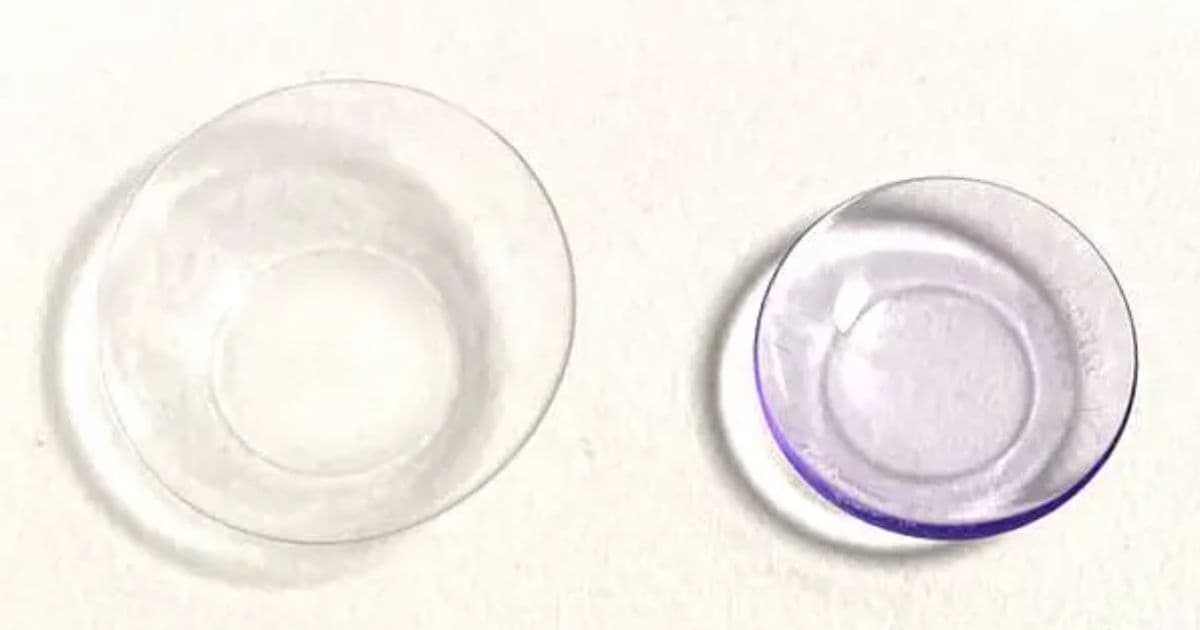Hard lens VS Soft lens

Hard lenses are different from soft lenses, both have their advantages. Find out the differences between the two types and which would suit your eyes best.
There are various categories of contact lenses for treating vision problems. Consult your eye doctor to select the best type of lenses for your needs and lifestyle.
Most HARD (rigid) LENSES are made of gas-permeable materials that allow oxygen to reach the cornea. This reduces the problems that can occur when the cornea doesn't get enough oxygen. These lenses date back to the 1960s, but it is true that even before then there were hard lenses, but they were not gas permeable, made of PMMA. In the category of rigid lenses we find hard polymethylmethacrylate lenses and gas permeable lenses.
1. Conventional hard lenses are made from a fairly rigid plastic called polymethylmethacrylate (PMMA), which does not mould to the shape of the eye. These lenses are cheap and durable, but are the least comfortable type of contact lens. They reduce the amount of oxygen reaching the cornea, and it's precisely because of this that wearers risk suffering from overuse syndrome and other problems. Their shape is smaller than ordinary lenses, and their edges are not glued to the cornea to let the eye breathe.
2. Rigid gas permeable (RGP) lenses cost more than conventional rigid lenses and are somewhat less durable, but are more comfortable than conventional rigid lenses. Some gas permeable lenses are designed for extended (overnight) wear, although many ophthalmologists advise you not to wear them for a long time or while sleeping. RGP lenses usually need to be replaced after 2 or 3 years of use.
Advantages of hard contact lenses:
- Very clear vision during wear;
- Corrects most eye diseases such as astigmatism or myopia;
- Can be used without being changed for a very long time;
- Ease of handling;
- Easier care system than soft contact lenses.
Disadvantages of hard contact lenses:
- Lower initial comfort than soft lenses;
- Longer fitting than soft lenses;
- Compared to soft lenses they have a higher chance of foreign objects penetrating under the lens, such as dust;
- Can scratch and break.
SOFT LENSES are made of soft, flexible plastics that absorb water (up to 90% of the lens weight). Many people find them more comfortable to wear than hard lenses, but hard lenses usually provide clearer vision. Soft lenses are more fragile than hard lenses and require more intensive cleaning. Soft lenses that can correct astigmatism are called toric lenses. This category includes products such as daily lenses, disposable lenses, or even longer-wear lenses.
1. Daily wear lenses are soft daily wear lenses that are taken out and cleaned at night and put back in again in the morning. They provide clear vision, but do not correct astigmatism as well as hard lenses. They take less time to get used to than hard lenses, but are less durable.
2. Extended wear lenses can be worn both day and night. After a few days, you take them out, clean them with the appropriate contact lens solution and wear them again. Some people's eyes may become irritated if contact lenses are not removed and cleaned routinely. Prolonged use can therefore be uncomfortable and increase the risk of eye damage. Although these lenses have been approved for 30-day use, many eye doctors have recommended that people remove them every day.
3. Disposable lenses are soft disposable lenses that are meant to be worn for up to a few weeks and then discarded. Many new contact lens wearers now choose disposable lenses. Disposable lenses were introduced because it was felt that replacing lenses more often would reduce the risks of corneal infection and dangerous complications from soft lenses.
Advantages of soft contact lenses:
- Greater initial comfort than hard or RGP lenses;
- Shorter adaptation period for new wearers;
- Ideal for intermittent wear;
- Less prone to foreign bodies getting under the lens, such as dust;
- Less light sensitivity than hard lenses or RGP;
- They rarely fall out of the eye, making them ideal for sports, especially contact sports such as football or basketball;
- Available in coloured versions.
Disadvantages of soft contact lenses:
- They are less durable than hard or RGP lenses;
- They can dry out, causing discomfort for some, especially under a hairdryer, in hot rooms or in windy, dry weather;
- More involved lens care, especially for conventional soft lenses;
- Predisposed to more protein or lipid deposition, which reduces lens performance over the long term;
- Can absorb chemicals from the environment, which can cause irritation.
Whichever lenses you choose to wear, hard or soft, they need to be cared for consistently with dedicated hard contact lens solutions and soft contact lens solutions. This way, you'll experience clearer, more comfortable vision and a more enjoyable lens wearing experience.
